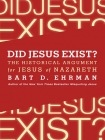Did Jesus Exist? - The Historical Argument for Jesus of Nazareth by Bart Ehrman (ebook reader browser .TXT) 📗

- Author: Bart Ehrman
Book online «Did Jesus Exist? - The Historical Argument for Jesus of Nazareth by Bart Ehrman (ebook reader browser .TXT) 📗». Author Bart Ehrman
It bears noting in this connection that Paul’s silences are not restricted to the life and teachings of Jesus. He is silent as well about many, many things that we desperately wish he would have talked about since we would like to know a good deal more about all sorts of matters. Think of all the silences of Paul with respect to Paul himself. Where was he from? Who were his parents? What was his education? Who were his teachers? Who were his friends? Who were his enemies? Why doesn’t he name any of them? What were his religious activities before converting? What was the “revelation” that made him convert? What did he do during his three years in Arabia or Damascus before meeting with Cephas in Jerusalem? Or in the following fourteen years? Where did he travel? What was his occupation? Or his daily routine? How did he convert people? Where did he meet them? What did he tell them? What happened once they accepted the gospel? And on and on and on.
There are thousands of things about Paul we would like to know. Why doesn’t he tell us any of them? Mainly because he had no occasion to do so. He was writing letters to his churches to deal with their problems, and for the most part he spent his time in these letters addressing the situations at hand. It is important to bear in mind that his audiences were made up entirely of Christian believers. We don’t know how much these people already knew—about Paul or, more important, about Jesus. If they were already fully informed about Jesus, then there was no need for Paul to remind them that Jesus walked on water, raised Jairus’s daughter from the dead, and was executed in Jerusalem.
Is it then unreasonable that Paul tells us relatively little about Jesus? Why not double-check with other authors? For we have writings produced years after Paul by Christians who certainly believed Jesus existed, and we can see whether in those writings we find references to the words and deeds of Jesus missing from Paul.
An obvious place to turn is to the other books of the New Testament. How many times do 1 Timothy, Hebrews, 1 Peter, and Revelation—all written by authors, as we have seen, who clearly indicate that Jesus existed—talk about Jesus’s parables, his miracles, his exorcisms, and so on? Never. Does that mean they don’t know about Jesus? No, it probably means that these traditions about Jesus’s life were not important to their purposes.
Or consider two even clearer cases, authors who certainly knew of actual Gospels of Jesus that we still have today. As I earlier mentioned, the author of 1, 2, and 3 John was living in the same community out of which the Gospel of John was produced, and he shows clear evidence of actually knowing John’s Gospel. And how many times does he quote it in his three letters? None at all. How often does he talk about Jesus’s parables, his miracles, his exorcisms, his trip to Jerusalem, his trial before Pilate? Never. Does that mean he doesn’t think Jesus lived?
So too with the book of Acts. In this case we are dealing with an author who actually wrote a Gospel, the first volume of his work, the Gospel of Luke. As I earlier indicated, about one-fourth of the book of Acts is dedicated to speeches allegedly delivered by the apostles. And in how many of those speeches do the apostles quote the words of the historical Jesus or at least the words of Jesus found in the Gospel of Luke? Almost never. The clearest quotation of Jesus is the one we considered before, “It is more blessed to give than to receive,” a saying that in fact is not even found in the Gospel of Luke. I should stress that these speeches deal with matters that Jesus himself often talked about—persecution, for example, and false teachers—but Jesus’s words on the subject are not quoted.
Or take later authors from outside the New Testament. The authors of both 1 Clement (from around 95 CE) and the Epistle of Barnabas (around 135 CE) show clear and compelling evidence that they know about Jesus and understand that he was a real historical figure. They say a number of things about him. But their silences are nearly as large as those of Paul. Just to consider some of the matters mentioned by Wells as “surprisingly” absent from Paul’s writings, neither 1 Clement nor Barnabas indicates that Jesus was born in Bethlehem to a virgin, that he came from Nazareth, that he experienced his temptations in the wilderness, that he ever told a parable, that he healed the sick, that he cast out demons, that he underwent a transfiguration, that he got into controversies with Pharisees, that he made a final journey to Jerusalem during the Passover, that he entered into the city riding a donkey, that he cleansed the Temple, that he had the Last Supper, that he went to Gethsemane, that he was betrayed by Judas Iscariot, that he was put on trial first before the high priest Caiaphas and then by the Roman governor Pontius Pilate, that the Jewish crowds convinced Pilate to release Barabbas instead of Jesus, and so on.
What do these silences show? They do not show that these authors did not know about the historical Jesus, because they clearly did. If anything, the silences simply show that these traditions about Jesus were not relevant to their purposes.
Why then does Paul not say more about the historical Jesus, if he knew more? One point I want to reemphasize. From what Paul does tell us, it is clear that





Comments (0)